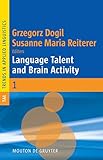Language Talent and Brain Activity / ed. by Grzegorz Dogil, Susanne Maria Reiterer.
Material type: TextSeries: Trends in Applied Linguistics [TAL] ; 1Publisher: Berlin ; Boston : De Gruyter Mouton, [2009]Copyright date: ©2009Description: 1 online resource (366 p.)Content type:
TextSeries: Trends in Applied Linguistics [TAL] ; 1Publisher: Berlin ; Boston : De Gruyter Mouton, [2009]Copyright date: ©2009Description: 1 online resource (366 p.)Content type: - 9783110205183
- 9783110215496
- P118.2.L3648 2009
- online - DeGruyter
- Issued also in print.
| Item type | Current library | Call number | URL | Status | Notes | Barcode | |
|---|---|---|---|---|---|---|---|
 eBook
eBook
|
Biblioteca "Angelicum" Pont. Univ. S.Tommaso d'Aquino Nuvola online | online - DeGruyter (Browse shelf(Opens below)) | Online access | Not for loan (Accesso limitato) | Accesso per gli utenti autorizzati / Access for authorized users | (dgr)9783110215496 |
Frontmatter -- Table of contents -- Short portraits of the authors -- Talent and proficiency in language -- Assessment of phonetic ability -- Cognitive aspects of pronunciation talent -- Personality and pronunciation talent in second language acquisition -- Functional imaging of language competentbrain areas -- Brain and language talent: a synopsis -- Foreign Accent Syndrome (FAS): An incidental “speech talent” following acquired brain damage? -- Musicality and phonetic language aptitude -- Sociolinguistic factors in language proficiency: phonetic convergence as a signature of pronunciation talent. -- Segmental factors in language proficiency: Coarticulatory resistance as a signature of pronunciation talent -- Prosodic factors in language proficiency: intonational variation as a signature of pronunciation talent -- Direct brain feedback and language learning from the gifted -- Beyond talent: a short language biography of Prof. Max Mangold -- Backmatter
restricted access online access with authorization star
http://purl.org/coar/access_right/c_16ec
This comprehensive project has the objective of describing and assessing pronunciation talent with special focus on its psychological and neural correlates. The first part of this undertaking describes the extensive tests necessary to measure phonetic talent in its various dimensions, such as production and perception, the segmental and suprasegmental levels of speech, and different utterance forms such as spontaneous speech, reading and imitation. Subjects are examined in their native language (German), a familiar second language (English) and, to a lesser degree, an unfamiliar language (Hindi). The project also investigates psychological and behavioral influences such as empathy or motivation on pronunciation performance, as well as correlations with general linguistic aptitude. The described measures and correlations allow a reliable classification of proficiency and talent level to be used in the selection of subjects for the neuroimaging studies in the second part of the project. These use functional magnetic resonance imaging in order to observe differences in brain activity between talented and untalented individuals during the performance of phonetic tasks (perception of phonetic differences, imitation, reading).
Issued also in print.
Mode of access: Internet via World Wide Web.
In English.
Description based on online resource; title from PDF title page (publisher's Web site, viewed 28. Feb 2023)


